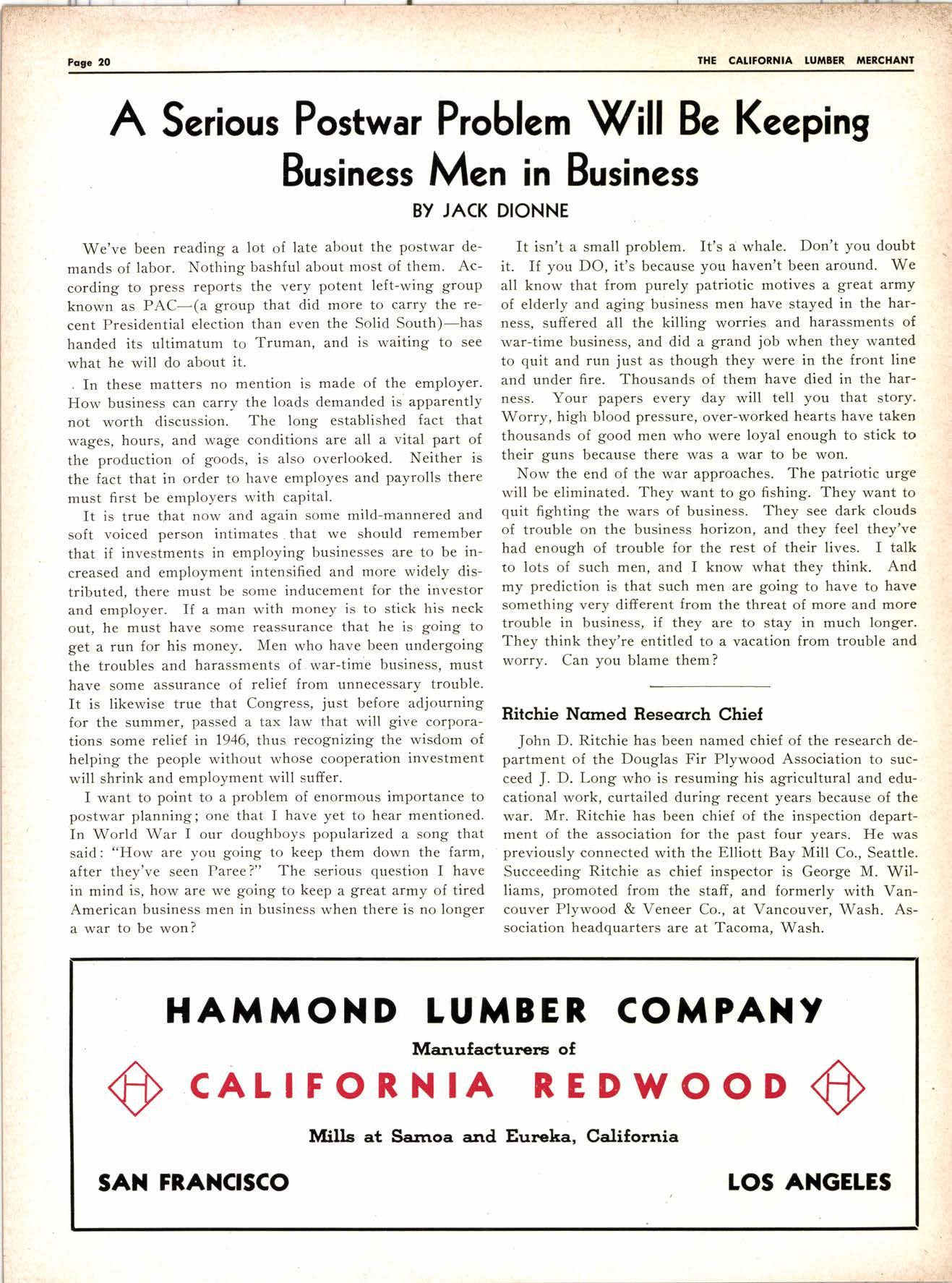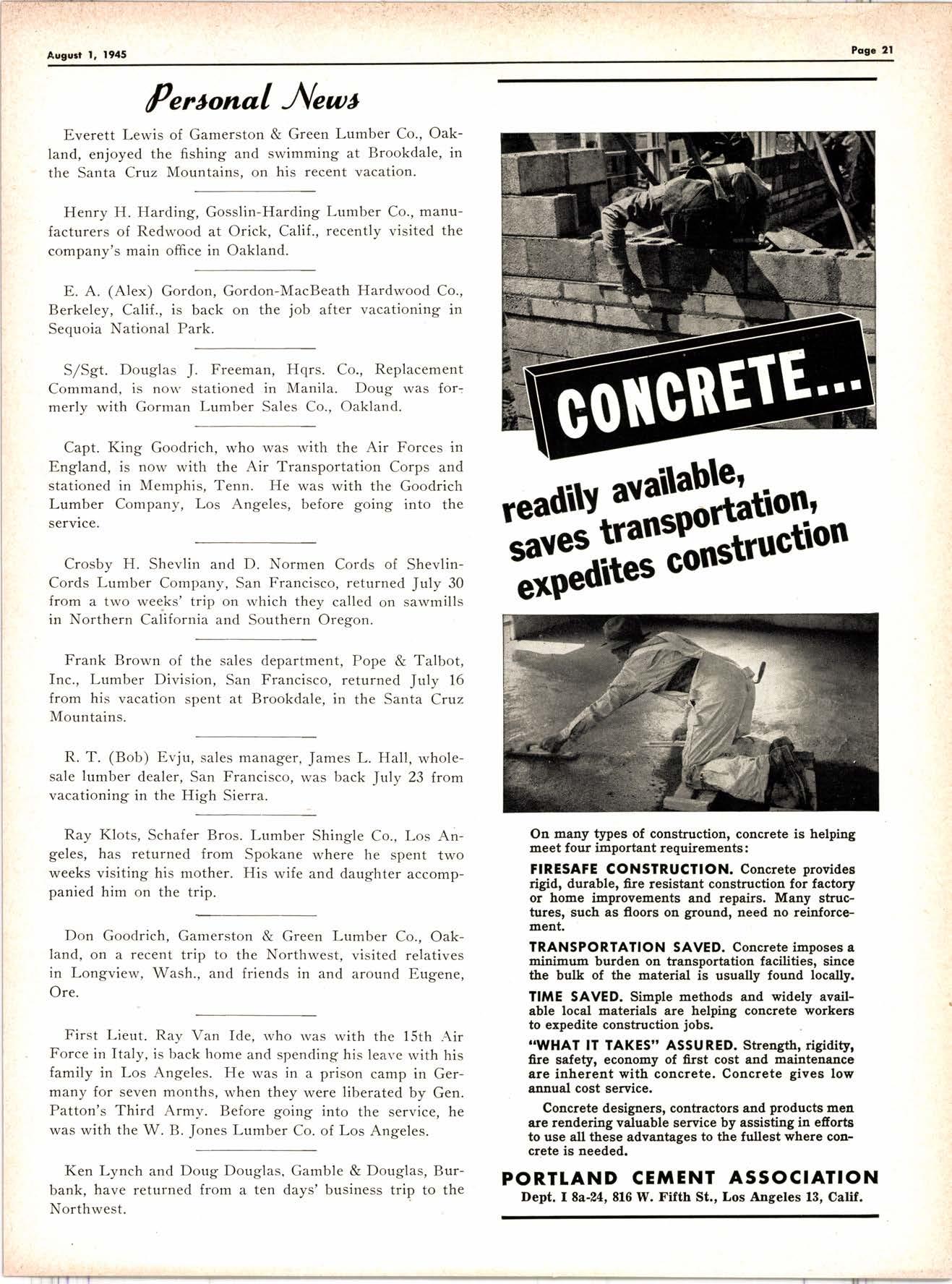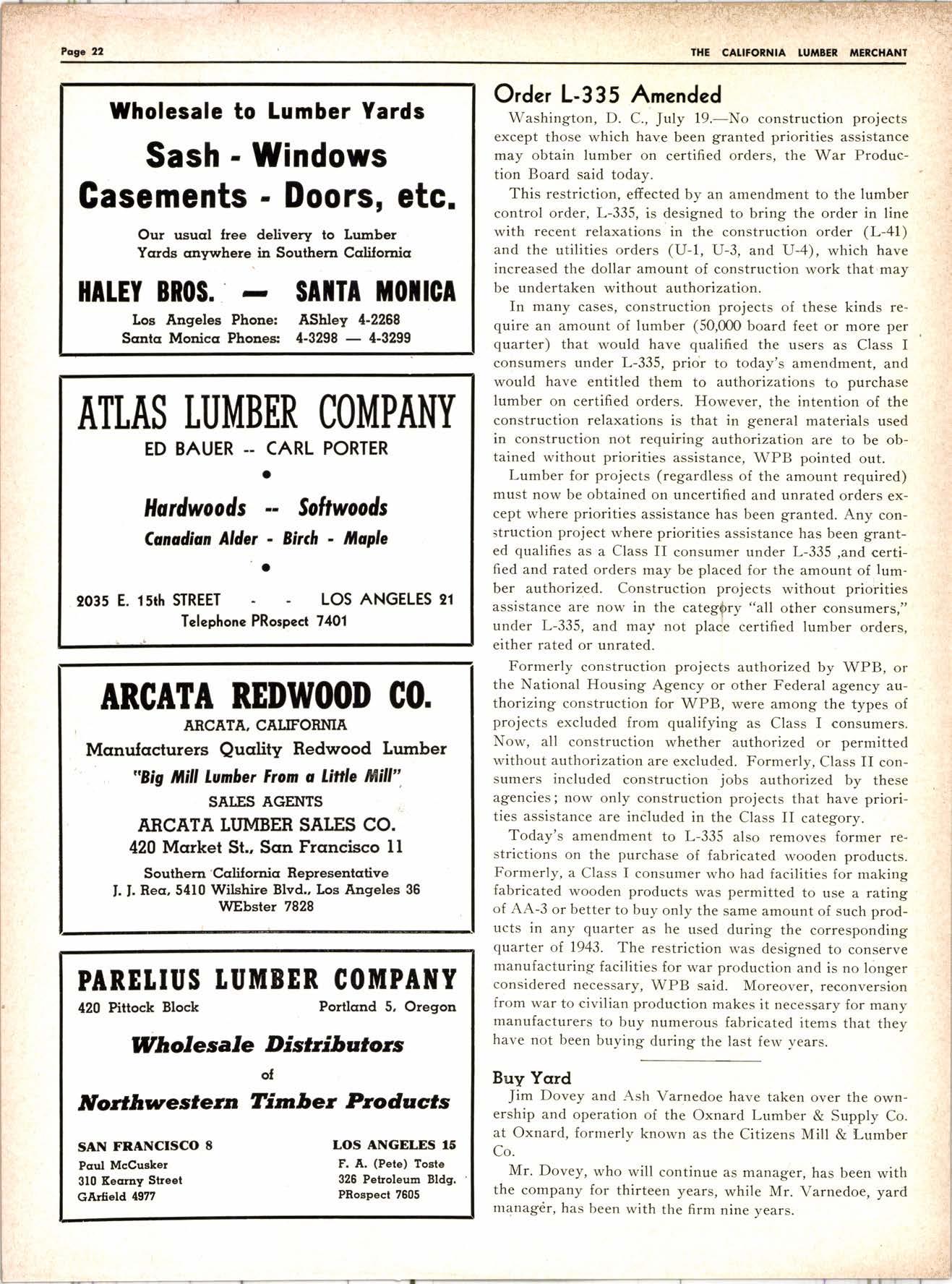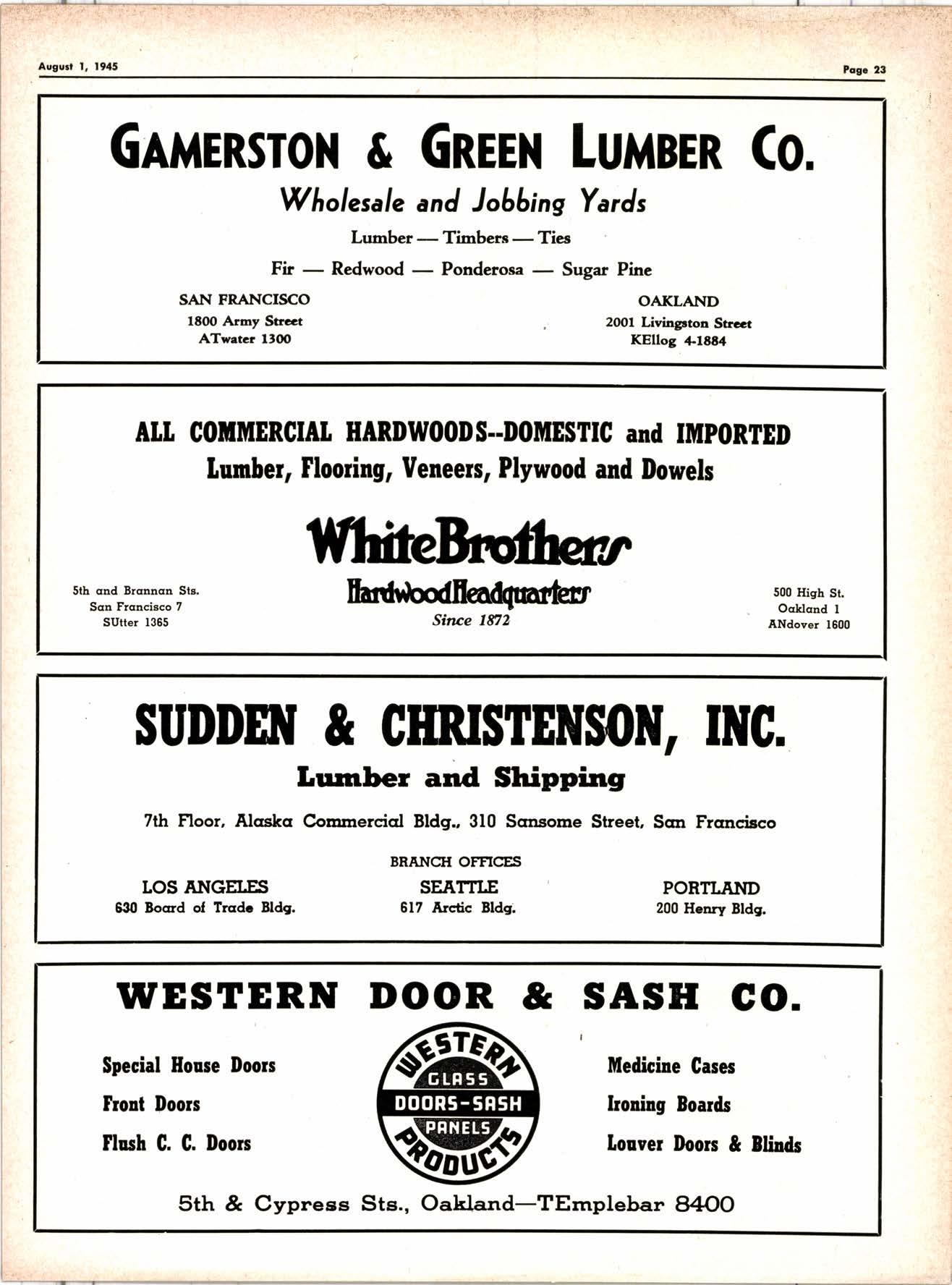
7 minute read
A Serious Postwar Problem Will Be Keeping Business Men in Business
BY JACK
'We've been reading a lot of late about the postwar demands of labor. Nothing bashful about most of them. According to press reports the very potent left-wing group known as PAC-(a group that did more to carry the recent Presidential election than even the Solid South)-has handed its ultimatum to Truman, and is waiting to see what he will do about it.
In these matters no mention is made of the employer. How business can carry the loads demanded is apparently not worth discussion. The long established fact that wages, hours, and wage conditions are all a vital part of the production of goods, is also overlooked. Neither is the fact that in order to have employes and payrolls there must first be employers with capital.
It is true that now and again some mild-mannered and soft voiced person intimates that we should remember that if investments in employing businesses are to be increased and employment intensified and more widely distributed, there must be some inducement for the investor and employer. If a man with money is to stick his neck out, he must have some reassurance that he is going to get a run for his money. Men who have been undergoing the troubles and harassments of war-time business, must have some assurance of relief from unnecessary trouble. It is likewise true that Congress, just before adjourning for the summer, passed a tax law that will give corporations some relief in 1946, thus recognizing the wisdom of helping the people without whose cooperation investment will shrink and employment will suffer.
I want to point to a problem of enormous importance to postwar planning; one that I have yet to hear mentioned. In World War I our doughboys popularized a song that said: "How are you going to keep them down the farm, after they've seen Paree ?" The serious question I have in mind is, how are we going to keep a great army of tired American business men in business when there is no longer a war to be won?
Dionne
It isn't a small problem. It's a whale. Don't you doubt it. If you DO, it's because you haven't been around. We all know that from purely patriotic motives a great army of elderly and aging business men have stayed in the harness, suffered all the killing worries and harassments of war-time business, and did a grand job when they wanted to quit and run just as though they were in the front line and under fire. Thousands of them have died in the harness. Your papers every day will tell you that story. Worry, high blood pressure, over-worked hearts have taken thousands of good men who were loyal enough to stick to their guns because there was a war to be won.
Now the end of the war approaches. The patriotic urge will be eliminated. They want to go fishing. They want to quit fighting the wars of business. They see dark clouds of trouble on the business horizon, and they feel they've had enough of trouble for the rest of their lives. I talk to lots of such men, and I know what they think. And my prediction is that such men are going to have to have something very different from the threat of more and more trouble in business, if they are to stay in much longer. They think they're entitled to a vacation from trouble and worrv. Can vou blame them?
Ritchie Ncmed Resecrrch Chiel
John D. Ritchie has been named chief of the research department of the Douglas Fir Plywood Association to succeed J. D. Long who is resuming his agricultural and educational work, curtailed during recent years because of the war. Mr. Ritchie has been chief of the inspection department of the association for the past four years. Ife was previously connected with the Elliott Bay Mill Co., Seattle. Succeeding Ritchie as chief inspector is George M. Williams, promoted from the staff, and formerly with Vancouver Plywood & Veneer Co., at Vancouver, Wash. Association headquarters are at Tacoma, Wash.
Ferronol Jt{"rt
Everett Lewis of Gamerston & Green Lumber Co., Oakland, enjoyed the fishing and swimming at Brookdale, in the Santa Cruz Mountains. on his recent vacation.
Henry H. Harding, facturers of Redwood company's main office
Gosslin-Harding at Orick, Calif., in Oakland.
Lumber Co., manurecently visited the
E. A. (Alex) Gordon, Gordon-MacBeath Hardwood Co., Berkeley, Calif., is back on the job after vacationing in Sequoia National Park.
S/Sgt. Douglas J. Freeman, Hqrs. Co., Replacement Command, is no"r' stationed in Manila. Doug was for: merly with Gorman Lumber Sales Co., Oakland.
Capt. King Goodrich, who was with the Air Forces in England, is now with the Air Transportation Corps and stationed in Memphis, Tenn. He was with the Goodrich Lumber Company, Los Angeles, before going into the service.
Crosby H. Shevlin and D. Normen Cords of ShevlinCords Lumber Company, San Francisco, returned July 30 from a two weeks' trip on which they called on sawmills in Northern California and Southern Oregon.
Frank Brown of the sales department, Pope & Talbot, fnc., Lumber Division, San Francisco, returned July 16 from his vacation sDent at Brookdale. in the Santa Cruz Mountains.
R. T. (Bob) Evju, sales manager, James L. Hall, wholesale lumber dealer, San Francisco, was back July 23 from vacationing in the High Sierra.
Ray Klots, Schafer Bros. Lumber geles, has returned from Spokane weeks visiting his mother. His wife panied him on the trip.
Shingle Co., Los Anwhere he spent two and daughter accomp-
Don Goodrich, Gamerston & Green Lumber Co.. Oakland, on a recent trip to the Northwest, visited relatives in Longview, Wash., and friends in and around Eugene, Ore.
First Lieut. R.y Van Ide, rvho rvas with the 15th Air Force in Italy, is back home ancl spending his leave with his family in Los Angeles. He was in a prison camp in Germany for seven months, when they were liberated by Gen. Patton's Third Army. Before going into the service, he was with the W. B. Jones Lumber Co. of Los Angeles.
Ken Lynch and Doug Douglas, Gamble & Douglas, Burbank, have returned from a ten days' business trip to the Northwest.
On many types of construction, concrete is helping meet four inportant requirements:
FIRESAFE CONSIRUCTION. Concrete provides rigid, durable, fire resistant construction for factory or home improvements and repairs. Many stnrctures, such as floors on ground, need no reinforcement.

TRANSPORTATION SAVED. Concrete imposes a rninimrrm burden on transportation facilities, since the bulk of tle material is usually found locdly.
TlrtAE SAVED. Simple methods and widely available local materials are helping concrete workers to erpedite construction jobs.
"WHAT lT TAKES" ASSURED. Strength, riSrdity, fre safety, economy of ffrst cost and maintenance are inherent with cotcrete. Concrete gives low annual cost serrice.
Concrete designers, contractors and products men are rendering valuable service by assisting in efiorts to use all tlrese advantages to the fullest where concrete is needed.
Wholesale to Lumber Yards Sash - Windows
Gasements - Doois, etc.
Our usual lree delivery to Lumber Ycrds cmywhere. in Southern Ccrlilomic
Order L-335 Amended
Washington, D. C., July 19.-No construction projects except those which have been granted priorities assistance may obtain lumber on certified orders, the War Production Board said today.
This restriction, effected by an amendment to the lumber control order, L-335, is designed to bring the order in line with recent relaxations in the construction order (L-41) and the utilities orders (U-1, U-3, and U-4), which have increased the dollar amount of construction work that may be undertaken without authorization.

Attas Tumber Company
Hardwoods
9035 E. 15th STREET LOS ANGELES 91 Telcphonc PRorpect 7401
ARCATA REDWOOD GO.
ANCATA, CAIJFONNIA
Mcrnulcrcturers Quclity Bedwood Lumber
*Big f|rill hunher From s Liitle frill".
SAI^ES AGENTS
ANCATA IT'MBER SAI.ES CO.
420 Mcrket St., S<rn Frcrncisco ll Southern'Ccliloraicr Representcrtive
J. J. Becr,5410 Wilshire Blvd., Los Angeles 36 WEbster 7828
PAREI,IUS I.UMBER GOMPATTY
420 Ptttock Block Portlcrnd 5, Oregon
Wholesale Disttibutots
Iforthwestern Timher Produets
SAN FRANGISCO 8 LOS ANGELES I5
Pcul McCusler F. A. (Pete) Togte
310 Eecrny Strect 326 Peholeum Bldg.
GArlield 4972 PRospect 7605
In many cases, construction projects of these kinds require an amount of lumber (50,000 board feet or more per quarter) that would have qualified the users as Class I consumers under L-335, prior to today's amendment, and would have entitled them to authorizations to purchase lumber on certified orders. However, the intention of the construction relaxations is that in general materials used in construction not requiring authorization are to be obtained without priorities assistance, WPB pointed out.
Lumber for projects (regardless of the amount required) must now be obtained on uncertified and unrated orders except where priorities assistance has been granted. Any construction project where priorities assistance has been granted qualifies as a Class fI consumer under L-335 ,and certified and rated orders may be placed for the amount of lumber authorized. Construction projects without priorities assistance are now in the categfry "all other consumers," under L-335, and may not place certified lumber orders, either rated or unrated.
Formerly construction projects authorized by WPB, or the National Housing Agency or other Federal agency authorizing construction for WPB, were among the types of projects excluded from qualifying as Class I consumers. Now, all construction whether authorized or permitted without authorization are excluded. Formerly. Class II consumers included construction jobs authorized by these agencies; now only construction projects that have priorities assistance are included in the Class II category.
Today's amendment to L-335 also removes former restrictions on the purchase of fabricated wooden products. Formerly, a Class I consumer who had facilities for making fabricated wooden products was permitted to use a rating of AA-3 or better to buy only the same amount of such products in any quarter as he used during the corresponding quarter of 1943. The restriction was designed to conserve manufacturing facilities for war production and is no longer considered necessary, WPB said. Moreover, reconversion from war to civilian production makes it necessary for many manufacturers to buy numerous fabricated items that they have not been buying during the last few vears.
Buy
Jim Dovey and Ash Varnedoe have taken over the ownership and operation of the Oxnard Lumber & Supply Co. at Oxnard, formerlv known as the Citizens Mill & I-umber Co.
Mr. Dovey, who will continue as manager, has been with the company for thirteen years, while Mr. Varnedoe, yard n.ranagdr, has been with the firm nine years.











